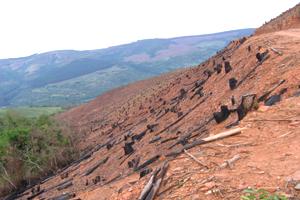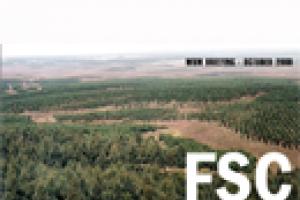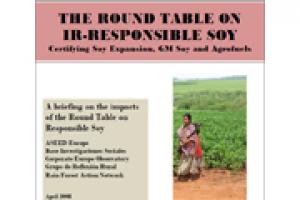The undersigned wish to urge members of the Forest Stewardship Council (FSC) to urgently resolve the serious problem of FSC certification of monoculture tree plantations, at the FSC general assembly to be held in Cape Town, South Africa.
One of the topics for discussion at the general assembly is a Review of FSC Principles and Criteria, and there is therefore an opportunity for changing those principles in such a way as to exclude the certification of monoculture tree plantations by FSC.
The Green Economy
The Green Economy is a tactic used to “clean up” the image of corporations rather than address corporate capture and capitalism as the true drivers of deforestation. False solutions promoted under the Green Economy include certification, sustainable forest management, ecosystem services, REDD+, the bioeconomy, nature-based climate solutions, and zero net deforestation. Rather than stopping it, these “solutions” support corporate-driven destruction that is causing a deep social and ecological crisis.
Other information
29 October 2008
In defence of Human Rights, Food Sovereignty, Biodiversity and Climate Justice
Ironically, on 16 October 2008, World Food and Food Sovereignty Day, a meeting will start in Cartagena (Colombia) to promote monoculture oil palm plantations, that are precisely the cause of so many violations of the Right to Food and contrary to food sovereignty insofar as they undermine the peoples’ right to produce their own food according to their territorial conditions and their food culture.
Other information
29 October 2008
Agrofuels have been presented as the solution to the climate crisis and as a "clean" alternative to fossil fuels. But in reality they are neither "green" nor environmentally friendly, no matter how international financial institutions (such as the World Bank and the Inter-American Development Bank, among others) and transnational corporations would like to promote them.
Publications
15 October 2008
Plantations are monocultures, created from seemingly endless rows of identical trees. They suck the water out of nearby streams and ponds and lower the water table, leaving little or no water for people living near the plantations. They deplete soils, pollute the environment with agrotoxics and eradicate biodiverse local ecosystems. Activists in Brazil call them the green desert because of the way they destroy local people's livelihoods and environments.
Other information
28 August 2008
Ignorance is the night of the mind, but a night without moon or star. -Confucius
Introduction
Other information
3 August 2008
"My house and goats are dead, my house burned to the ground," recounts a Ugandan farmer at the start of this downloadable film. "My coffee and banana trees were chopped down, and new trees were planted in their place."
"We should bring developing countries on board using a variety of means," counters a Dutch businessman and carbon trader.
Other information
27 May 2008
The expansion of large-scale plantations --either crops or trees-- for the production of liquid agrofuels such as bioethanol and biodiesel is increasing in many Southern countries –with harmful impacts on people and the environment.
Now, even the FAO admits the risks. A recently published FAO report looks into agrofuel production and their gendered impacts, explaining that it may increase the marginalization of women in rural areas, threatening their livelihoods.
Other information
27 May 2008
Biofuels – bio-diesel oil extracted from plants to replace high cost fossil fuels – have become controversial as the biofuel plantations are taking away lands mainly used, in particular for food production, by local communities.
In Burma, the ruling military junta has embarked on a massive expansion of biofuel plantations through forced confiscation of lands as well as arrests, fines, and beatings of farmers.
Bulletin articles
27 May 2008
In Africa, agrofuel initiatives are proliferating in many countries including Zambia, where jatropha has been selected as the main crop to produce biodiesel while sugar cane, sweet sorghum and cassava are chosen for bioethanol.
Other information
30 April 2008
Certifying Soy Expansion, GM Soy and Agrofuels
ASEED Europe, Base Investigaciones Sociales, Corporate Europe Observatory, Grupo de Reflexión Rural, Rain Forest Action Network - April 2008
Other information
17 April 2008
Press Release - 17 April 2008, International Day of Peasant's Struggle.
Asunción, Paraguay






